June 14, 2025 | 19:15 GMT +7
June 14, 2025 | 19:15 GMT +7
Hotline: 0913.378.918
June 14, 2025 | 19:15 GMT +7
Hotline: 0913.378.918
Nguyen Tri Phung's beekeeping model is well-known in Hoa Quy hamlet, Hoa Ninh commune, Long Ho district, Vinh Long province. Currently, he owns 400 boxes of honey hives. The apiculture model is not a novel profession in the Southwest, but it is uncommon for an agricultural family to acquire Phung's extensive model and experience.
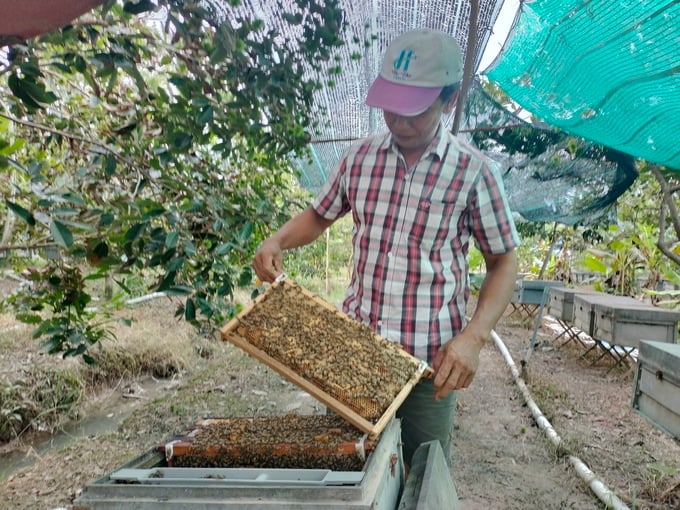
Mr. Nguyen Tri Phung in Hoa Quy hamlet, Hoa Ninh commune, Long Ho district (Vinh Long) has been keeping honey bees for over 10 years. Photo: Minh Dam.
Phung disclosed that he learned about the profession from Southeast proprietors. The islands of four Long Ho communes are home to luxuriant trees. When the blossoming seasons of longan and rambutan flowers arrive, beekeepers dispatch their hives of bees to the plantations so that farmers can harvest honey. The beekeepers recognize the generosity of the locals, so they refrain from concealing their profession; instead, they employ locals to help collect honey and progressively impart their breeding knowledge.
Apiculture is required in locations with flowering plants. When a flower's ovary transforms into a fruit, the mission of the bees' swarm is complete, and beekeepers relocate the swarm to new honey fields, such as melaleuca forests in Long An or lychee gardens in Bac Giang.
When the melaleuca flowers blossom in lunar December, as the Tet holiday approaches, beekeepers like Phung return to Long An to release pollinators for honey. The nectar of melaleuca is green and smells like fish sauce. Melaleuca nectar is superior to the nectar of longan and rambutan blossoms, but people in the Southwest prefer longan nectar due to the former's unfamiliar aroma.
According to Phung, significant quantities of bees frequently contract diseases like rot, diarrhea, etc. The disease must be promptly detected and treated by beekeepers.
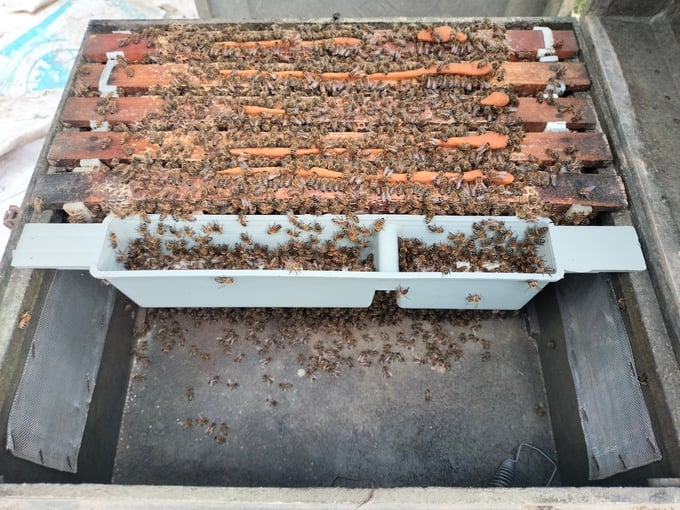
Each box of bees has thousands of worker bees, each time getting more than 2 liters of honey. Photo: Minh Dam.
As honey is a popular export product throughout the world, beekeepers are prohibited from using antibiotics to treat diseases or increase bee resistance.
When flower season is over and the beekeeper has not relocated the bee colony, he must feed the bees dried sugar, soy powder, and should not mix sugar water for the bees to consume. Because the sugar water will then infiltrate into the bile and impair its quality. The bees that are fed are immature bees that cannot yet search for food; therefore, they must be fed weaning. In addition, worker bees must consume bee bread in order to produce a food source that's similar to mammalian milk, which they feed to developing larvae, adult bees, and the queen.
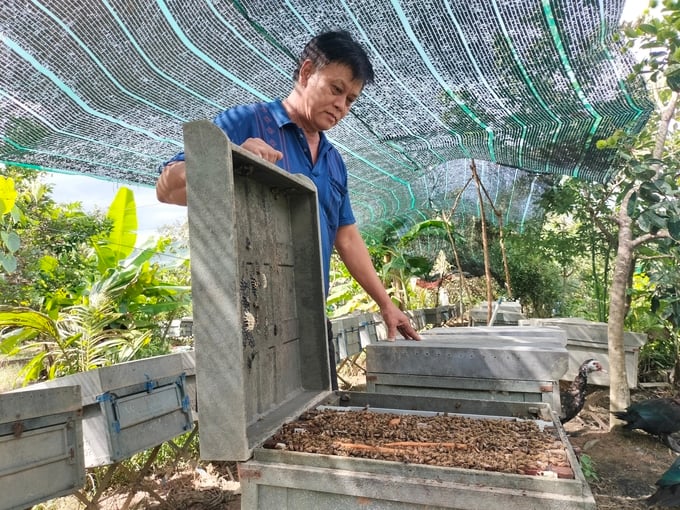
Beekeepers often bring bees to find honey. Photo: Minh Dam.
According to Phung, each hive contains several thousand worker bees commanded by a queen bee. The box is composed of 6-7 frames, which the hive adheres to. During the flowering season, the beekeeper will turn the honey once per week, and each box of bees will produce approximately three liters of honey. And when the season is over, the owner must wait 20 days to a month to harvest honey.
Traders pay between 40,000 and 70,000 VND per kilogram (0.7 liters) of honey, depending on the season, but this is a bargain compared to the price of natural honey, which can reach up to 1.4 million VND per kilogram. The revenue generated by Phung's model exceeds 300 million VND per year.
He stated that there are two factors that contribute to the low price of cultivated honey: first, the yield is very high, and second, the quality is inferior to that of natural honey because it contains more water.
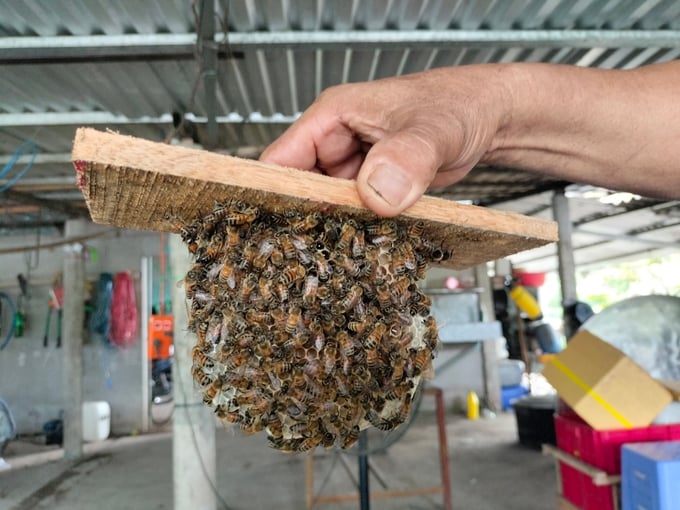
The raising queen bee prepares to separate. Photo: Minh Dam.
Honey beekeeping is an ecological paradigm with numerous advantages; in addition to providing economic benefits, it also helps plants to pollinate exceptionally well; many newly pollinated fruit trees have a high fruiting rate. This island, according to Phung, is famous for its rambutan trees. Initially, people planted Java rambutan, a species of rambutan with enormous, succulent flesh and a lengthy beard. After that, there are additional rambutan varieties with brief beards, dry flesh, and tasty food. Many quantities of Java rambutan fruit are produced as a result of honey bees; the fruit begins to diminish, the beard becomes shorter, and the flesh becomes drier, making it more palatable.
Today, producers also rely on these "soldiers" to pollinate crops, particularly melons, cucumbers, and watermelons cultivated in net houses and greenhouses. In the province of Long An, watermelon producers frequently employ bees to pollinate in lieu of expensive and scarce labor.
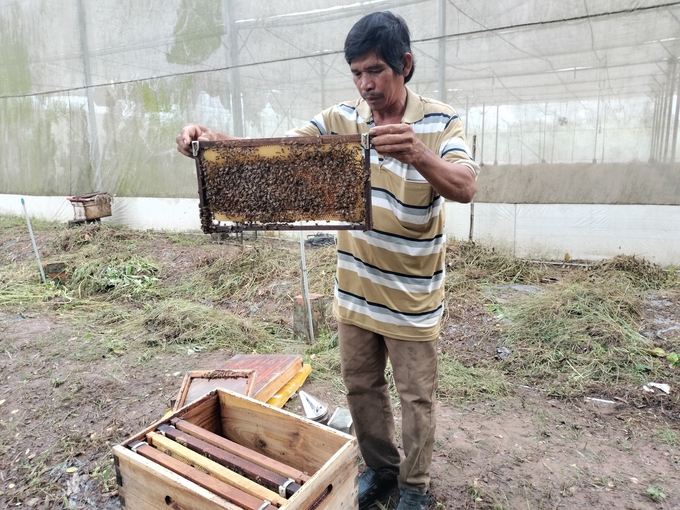
Raising honey bees at Long Thuan Safe Vegetable Cooperative, Hong Ngu district (Dong Thap) to help pollinate crops. Photo: Minh Dam.
Due to the aforementioned advantages, people no longer oppose beekeeping and are eager to receive these "special guests" In the isle of four communes in the Long Ho district, there are approximately 20 beekeeping households and dozens of proprietors from various locations that send honey to collect honey during the flowering season. Apiculture is more developed than in the past.
4 communes is also a well-known tourist destination in the province of Vinh Long; many foreign visitors come to enjoy the tranquility of the river gardens. In addition, to produce, visitors to the garden can also consume honey there.
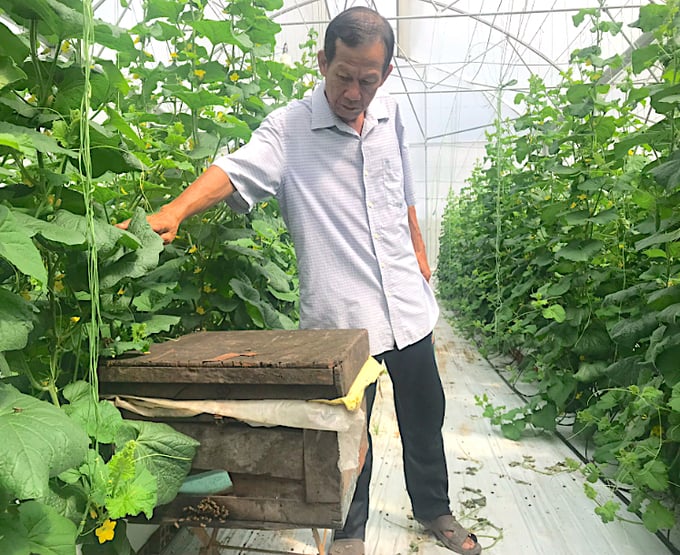
Using honey bees to pollinate melons saves a lot of labor. Photo: Minh Dam.
Today, honey cultivation is more developed in the Mekong Delta. From the region of Soc Trang back to Can Tho, Vinh Long, Tien Giang, and Long An, beekeeping is extremely popular. Specifically in Vinh Long, in 2022, the Vinh Long Hi-tech Honey Production and Consumption Cooperative (Cai Nhum Town, Mang Thit District) was established, production investments were made, and input-output links were established, including a large number of members in the Long Ho district's four island communes.
Translated by Linh Linh

(VAN) The working delegation from the Ministry of Agriculture and Environment conducted an important trip to the Netherlands to strengthen strategic partnerships and sustainable development in the agricultural sector.

(VAN) The letter ‘A Plea from the Ocean’ not only evokes emotion but also awakens the human conscience to the responsibility of protecting life on Earth.

(VAN) The Department of Agriculture in South Africa has announced the country’s first mass vaccination of poultry to prevent local birds from contracting avian influenza.

(VAN) Establishment of the Mekong Delta Regional Agricultural Linkage Center, aiming for a closed value chain, deep processing, trading platforms, and international market connectivity.

(VAN) Gia Lai province has recently recorded 460 rare species of animals and plants, contributing to forest conservation and biodiversity planning in the region.

(VAN) Ms. Caroline Beresford, New Zealand Ambassador to Vietnam, expressed confidence that agricultural cooperation between Vietnam and New Zealand will develop sustainably, be climate-resilient, and promote gender equality.

(VAN) Vietnam reaffirms its commitment to international cooperation in fostering sustainable and responsible fisheries while ensuring resilient livelihoods for small-scale fishing communities.